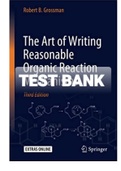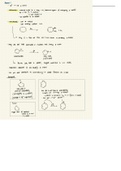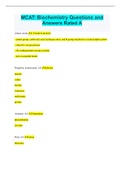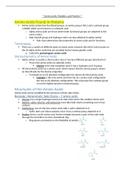Nonaromatic - Study guides, Class notes & Summaries
Looking for the best study guides, study notes and summaries about Nonaromatic? On this page you'll find 24 study documents about Nonaromatic.
Page 3 out of 24 results
Sort by

-
Exam (elaborations) TEST BANK FOR The Art of Writing Reasonable Organic Reaction Mechanisms 3rd Edition By Grossman
- Exam (elaborations) • 237 pages • 2021
-
- $15.49
- + learn more
Exam (elaborations) TEST BANK FOR The Art of Writing Reasonable Organic Reaction Mechanisms 3rd Edition By Robert B. Grossman (Solution Manual) sp2 hybridization. One of the lone pairs is in a p orbital, and the other is in an sp2 orbital. Only the lone pair in the p orbital is used in resonance. 1.5. (a) No by-products. C(1–3) and C(6–9) are the keys to numbering. (b) After numbering the major product, C6 and Br25 are left over, so make a bond between them and call it the by-product....

-
Organic Chemistry 2: Summary of Aromatic Compounds
- Summary • 5 pages • 2022
- Available in package deal
-
- $5.49
- + learn more
This document is a summary of the aromatic compounds chapter of the organic chemistry 2 course. It is digitally taken, handwritten notes. Notes in this chapter cover aromaticity, including Huckel’s number. It also includes a list of the most common aromatic compounds that must be memorized, naming di and tri substituted benzene derivatives. Lastly, it includes reactions on the side chain of a benzene ring, showing mechanisms as necessary as well as notes that further explain anything that ma...

-
MCAT: Biochemistry Questions and Answers Rated A
- Exam (elaborations) • 24 pages • 2022
-
Available in package deal
-
- $9.99
- + learn more
MCAT: Biochemistry Questions and Answers Rated A Amino Acids - Found in proteins - amino group, carboxylic acid, hydrogen atom, and R group attached to a central alpha carbon - chiral (L) except glycine - (S) configuaration except cysteine - join via peptide bonds Nonpolar, nonaromatic AA glycine alanine valine leucine isoleucine methionine proline Aromatic AA tryptophan phenylalanine tyrosine Polar AA serine threonine asparagine glutamine cysteine Acidic (- charge) AA aspartic acid glutami...

-
Amino Acids, Peptides, and Proteins
- Exam (elaborations) • 111 pages • 2023
-
- $13.99
- + learn more
Amino Acids Found in Proteins • Amino acids contain two functional groups, an amino group (-NH2) and a carboxyl group (-COOH) which are formed on a carboxylic acid. o Alpha amino acids are those where both functional groups are attached to the same carbon. o Side chain/R group and hydrogen atom are also attached to alpha carbon. Side chain determines the properties of amino acids and its functions. Terminology • There are a variety of different types of amino acids, however the MCA...

Do you wonder why so many students wear nice clothes, have money to spare and enjoy tons of free time? Well, they sell on Stuvia! Imagine your study notes being downloaded a dozen times for $15 each. Every. Single. Day. Discover all about earning on Stuvia


